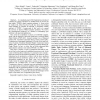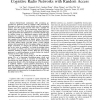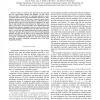119 search results - page 22 / 24 » The complexity of pure Nash equilibria |
111
click to vote
FOCS
2009
IEEE
15 years 7 months ago
2009
IEEE
— In a landmark paper [32], Papadimitriou introduced a number of syntactic subclasses of TFNP based on proof styles that (unlike TFNP) admit complete problems. A recent series of...
130
Voted
INFOCOM
2011
IEEE
14 years 4 months ago
2011
IEEE
Abstract—Market-based mechanisms offer promising approaches for spectrum access in cognitive radio networks. In this paper, we focus on two market models, one with a monopoly pri...
124
Voted
ICC
2007
IEEE
15 years 7 months ago
2007
IEEE
— There is a need for new spectrum access protocols that are opportunistic, flexible and efficient, yet fair. Game theory provides a framework for analyzing spectrum access, a ...
120
Voted
SIGECOM
2006
ACM
15 years 7 months ago
2006
ACM
In traditional game theory, players are typically endowed with exogenously given knowledge of the structure of the game—either full omniscient knowledge or partial but fixed in...
101
click to vote
ECAI
2006
Springer
15 years 4 months ago
2006
Springer
Abstract. Game theory is a widely used formal model for studying strategical interactions between agents. Boolean games [8] are two players, zero-sum static games where players...




